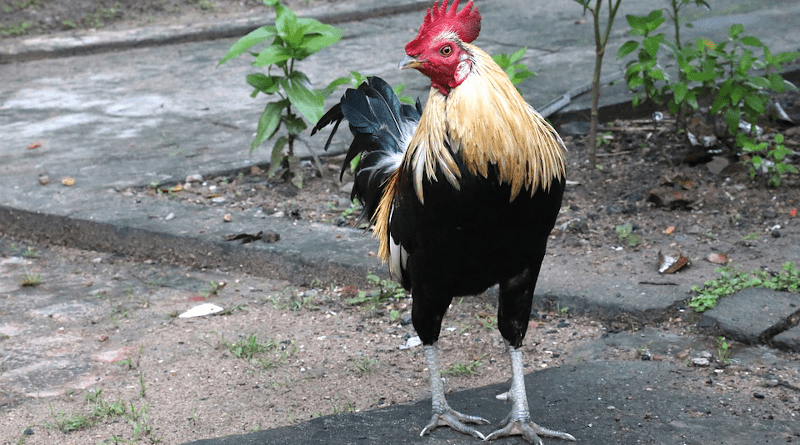Malaysia: Who Is Manipulating The Chicken Market? – Analysis
Is over-regulation promoting the supply shortage?
Malaysia is currently undergoing a shortage of chicken due to local production failing to cope with demand. Malaysia’s antiquated and over-zealous regulatory approach to the economy is damaging the dynamics of the chicken trade. Setting a maximum price of RM 9.30 over the Chinese new year and festive season, while controlling imports through selective Approved Permits (APs), or import licenses are distorting the market to the grave determent of consumers.
Malaysia’s annual consumer of chicken is nearly 50 kilograms per person, the prime source of protein for Malaysians. This equates to 1,62 million tonnes consumption per annum, of which 98.4 percent was supplied by domestic producers in 2019. Excess domestic capacity supplies 37 percent of Singapore consumption needs. There are about 25 major producers in Malaysia which includes companies like Leong Hup Holdings, QSR Brands, FFM, Hy-Fresh, and Sum Soon. There are also a host of small and medium producers within the industry. These companies tend to be active across the supply chain, thus integrating the industry.
The poultry industry has been the bright shinning light of the livestock industry. Highly automated and capital intensive, it’s the only sector which produced in excess to national needs, leaving cattle and goat production far behind.
During the pandemic, local producers have faced a 30 percent rise in the cost of production. Corn and soyabean meals which make up more than 60 percent of production costs have risen due to the weakening of the Ringgit, and the hike in shipping costs. In addition, supply chain disruptions have led to shortages of feed additives, hindering production.
The temporary Malaysian Family Price Control Scheme which has pegged a maximum price of chicken to RM 8.00 wholesale, and RM 9.30 retail is squeezing producer profit margins. Many small to medium producers are suffering heavy financial losses. Without any government subsidies to assist, some producers have switched to the production of other value-added chicken based consumer products to escape price controls. Others sell their production on the black market outside price controls.
Last December, the minister for domestic trade Alexander Nanta Linggi assured consumers the government would allow the importation of chicken as a temporary measure to stabilize prices at retail level. Demand for chicken has drastically increased with the easing of Covid MCO restrictions, which is outstripping the ability of local producers to cater for immediate demand.
According to reports, 32 companies were granted APs or import permits to overcome the shortage of chicken supply, mid to late December. According to the minister of agriculture and food industries (MAFI) Dr Ronald Kiandee, the targeted source countries were Thailand, China, and Brazil, even though prices from these three countries were higher than sources from other countries, according to industry sources.
Thailand is currently facing a Swine fever outbreak which has led to a sudden rise for demand of chicken. China is currently a net importer of chicken. Brazil is also a questionable source, as meat and chicken exports have been banned from most Middle Eastern destinations due to questions over halal integrity.
The high prices of Thai produced chicken was publicly acknowledged by the director-general of the Department of Veterinary Services (DVS), Dr Norlizan Mohd Noor, the officer responsible for issuing Aps for importing chicken into Malaysia.
Mydin Emporium Group managing director Ameer Ali publicly exclaimed his disappointment that no retailers were granted import permits for chicken, even though they met all the requirements from DVS to be granted permits. It is also believed that Tesco also didn’t get a permit. Granting import permits directly to retailers would have brought price relief to consumers, rather than chicken now having to go through wholesalers that apply their own margins to the product.
Industry insiders complained to the author that granting of import permits to companies which were buying at USD 2,000 MT, and selling onto retailers at RM 8.00 per kilogram, was not in the public interest, when submissions to DVS for import permits were able to source frozen chickens meeting Malaysian halal standards for USD 1,300 MT. These savings could have taken a lot of stress on the market prices over the festive season.
Industry insiders also complained to the author that DVS and JAKIM requested meetings with applicants for chicken APs specifying other conditions outside the application process. This is at a time when many Malaysian consumers are financially stressed and the nation is facing chronic chicken shortages.
Malaysia global rank in Transparency International’s annual Corruption Perceptions Index 2021 dropped five positions this year. Malaysia now ranks 62 out of 180, the lowest since the Corruption Perceptions Index was revised in 2012.
A request was made to the director-general of DVS Dr Norlizan Mohd Noor for an interview over the above issue. At the time of writing no reply was received. The Department of Islamic Development of Malaysia (JAKIM) was also contacted, with a reply stated JAKIM wasn’t interested in any interview.
Regulation, bureaucracy, and corruption are costing Malaysian consumers.

